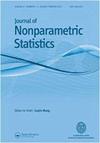Efficient nonparametric estimation of generalised autocovariances
IF 0.9
4区 数学
Q3 STATISTICS & PROBABILITY
引用次数: 0
Abstract
This paper provides a necessary and sufficient condition for asymptotic efficiency of a nonparametric estimator of the generalised autocovariance function of a stationary random process. The generalised autocovariance function is the inverse Fourier transform of a power transformation of the spectral density and encompasses the traditional and inverse autocovariance functions as particular cases. A nonparametric estimator is based on the inverse discrete Fourier transform of the power transformation of the pooled periodogram. We consider two cases: the fixed bandwidth design and the adaptive bandwidth design. The general result on the asymptotic efficiency, established for linear processes, is then applied to the class of stationary ARMA processes and its implications are discussed. Finally, we illustrate that for a class of contrast functionals and spectral densities, the minimum contrast estimator of the spectral density satisfies a Yule–Walker system of equations in the generalised autocovariance estimator.广义自协方差的有效非参数估计
本文给出了平稳随机过程广义自协方差函数的非参数估计量渐近有效的一个充分必要条件。广义自协方差函数是谱密度幂变换的傅里叶反变换,包含传统自协方差函数和逆自协方差函数作为特殊情况。非参数估计是基于池化周期图幂变换的离散傅里叶反变换。我们考虑了两种情况:固定带宽设计和自适应带宽设计。然后将线性过程的渐近效率的一般结果应用于一类平稳ARMA过程,并讨论了其意义。最后,我们证明了对于一类对比泛函和谱密度,谱密度的最小对比估计量在广义自协方差估计量中满足Yule-Walker方程组。
本文章由计算机程序翻译,如有差异,请以英文原文为准。
求助全文
约1分钟内获得全文
求助全文
来源期刊

Journal of Nonparametric Statistics
数学-统计学与概率论
CiteScore
1.50
自引率
8.30%
发文量
42
审稿时长
6-12 weeks
期刊介绍:
Journal of Nonparametric Statistics provides a medium for the publication of research and survey work in nonparametric statistics and related areas. The scope includes, but is not limited to the following topics:
Nonparametric modeling,
Nonparametric function estimation,
Rank and other robust and distribution-free procedures,
Resampling methods,
Lack-of-fit testing,
Multivariate analysis,
Inference with high-dimensional data,
Dimension reduction and variable selection,
Methods for errors in variables, missing, censored, and other incomplete data structures,
Inference of stochastic processes,
Sample surveys,
Time series analysis,
Longitudinal and functional data analysis,
Nonparametric Bayes methods and decision procedures,
Semiparametric models and procedures,
Statistical methods for imaging and tomography,
Statistical inverse problems,
Financial statistics and econometrics,
Bioinformatics and comparative genomics,
Statistical algorithms and machine learning.
Both the theory and applications of nonparametric statistics are covered in the journal. Research applying nonparametric methods to medicine, engineering, technology, science and humanities is welcomed, provided the novelty and quality level are of the highest order.
Authors are encouraged to submit supplementary technical arguments, computer code, data analysed in the paper or any additional information for online publication along with the published paper.
 求助内容:
求助内容: 应助结果提醒方式:
应助结果提醒方式:


